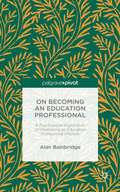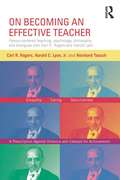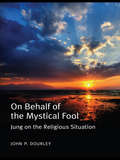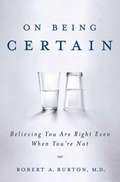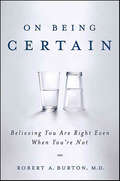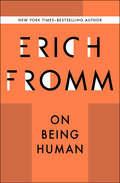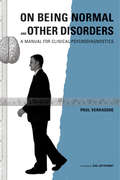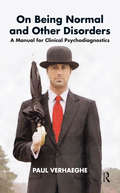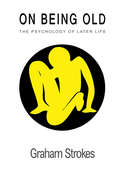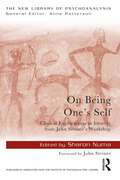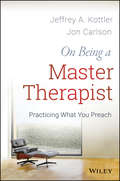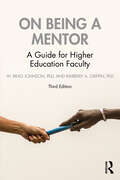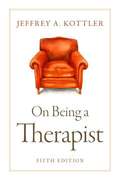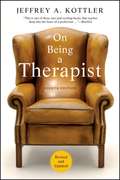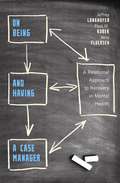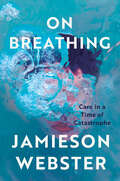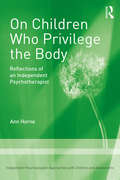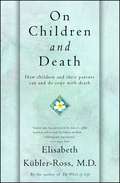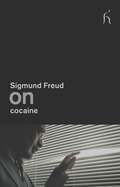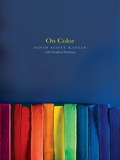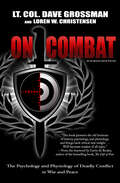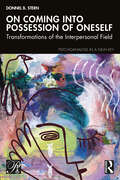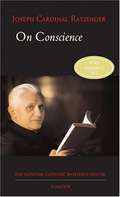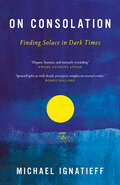- Table View
- List View
On Becoming an Education Professional: A Psychosocial Exploration of Developing an Educational Professional Practice
by Alan BainbridgeOn Becoming an Education Professional.
On Becoming an Effective Teacher: Person-centered teaching, psychology, philosophy, and dialogues with Carl R. Rogers and Harold Lyon
by Carl R Rogers Harold C Lyon Reinhard TauschOn Becoming an Effective Teacher describes exemplary practices like Teach For America, which highlight the power of person-centered teaching to bring about higher student achievement and emotional intelligence. Lyon situates the classic with the cutting-edge, integrating wisdom with research, anecdote with practical advice, to find truths that reveal paths toward effective teaching. Jeffrey Cornelius-White, Psy.D., LPC, Professor of Counseling, Missouri State University, USA, Author of Learner Centered Instruction: Building Relationships for Student Success This fascinating book reveals through current research and contemporary applications that Carl Rogers’ pioneering and radical approach to education is as relevant today as it was in the 1970s and ‘80s. Brian Thorne, University of East Anglia, UK Carl Rogers is one of the most influential psychologists of the twentieth century. His influence is similarly outstanding in the fields of education, counselling, psychotherapy, conflict resolution, and peace. On Becoming an Effective Teacher presents the final unpublished writings of Rogers and as such has, not only unique historical value, but also a vital message for today’s educational crises, and can be read as a prescription against violence in our schools. It documents the research results of four highly relevant, related but independent studies which comprise the biggest collection of data ever accumulated to test a person-centred theory in the field of education. This body of comprehensive research on effective teaching was accomplished over a twenty-year period in 42 U.S. States and in six other countries including the UK, Germany, Brazil, Canada, Israel, and Mexico and is highly relevant to the concerns of teachers, psychologists, students, and parents. The principal findings of the research in this book show that teachers and schools can significantly improve their effectiveness through programs focusing on facilitative interpersonal relationships. Teachers who either naturally have, or are trained to have empathy, genuineness (congruence), and who prize their students (positive regard) create an important level of trust in the classroom and exert significant positive effects on student outcomes including achievement scores, interpersonal functioning, self-concept, attendance, and violence. The dialogues between Rogers and Lyon offer a unique and timeless perspective on teaching, counselling and learning. The work of Reinhard Tausch on person-centered teaching for counselors, parents, athletics, and even textbook materials, and the empathic interactions of teachers and students, is among the most thorough and rigorous research ever accomplished on the significance and potential of a person-centered approach to teaching and learning. This pioneering textbook is highly relevant to educational psychologists and researchers, as well as those in undergraduate and graduate university courses in education, teacher training, counseling, psychology and educational psychology.
On Behalf of the Mystical Fool: Jung on the Religious Situation
by John P. DourleyJung's explanation of the religious tendency of the psyche addresses many sides of the contemporary debate on religion and the role that it has in individual and social life. This book discusses the emergence of a new mythic consciousness and details ways in which this consciousness supersedes traditional concepts of religion to provide a spirituality of more universal inclusion. On Behalf of the Mystical Fool examines Jung's critique of traditional western religion, demonstrating the negative consequences of religious and political collective unconsciousness, and their consequent social irresponsibility in today's culture. The book concludes by suggesting that a new religiosity and spirituality is currently emerging in the West based on the individual’s access to the sense of ultimacy residual in the psyche, and seeking expression in a myth of a much wider compass. This book will be of interest to scholars and students at all levels who are engaged in the expanding field of Jungian studies. It will also be key reading for anyone interested in the theoretical and therapeutic connections between the psyche and religious experience.
On Being Certain: Believing You Are Right Even When You're Not
by Robert A. BurtonBurton challenges the notions of how we think about what we know. He shows that the feeling of certainty we have when we know something comes from sources beyond our control and knowledge. In fact, certainty is a mental sensation, rather than evidence of fact. Because this feeling of knowing seems like confirmation of knowledge, we tend to think of it as a product of reason. But an increasing body of evidence suggests that feelings such as certainty stem from primitive areas of the brain and are independent of active, conscious reflection and reasoning. The feeling of knowing happens to us; we cannot make it happen.
On Being Certain: Believing You Are Right Even When You're Not
by Robert A. BurtonYou recognize when you know something for certain, right? You "know" the sky is blue, or that the traffic light had turned green, or where you were on the morning of September 11, 2001--you know these things, well, because you just do.In On Being Certain, neurologist Robert Burton challenges the notions of how we think about what we know. He shows that the feeling of certainty we have when we "know" something comes from sources beyond our control and knowledge. In fact, certainty is a mental sensation, rather than evidence of fact. Because this "feeling of knowing" seems like confirmation of knowledge, we tend to think of it as a product of reason. But an increasing body of evidence suggests that feelings such as certainty stem from primitive areas of the brain, and are independent of active, conscious reflection and reasoning. The feeling of knowing happens to us; we cannot make it happen.Bringing together cutting edge neuroscience, experimental data, and fascinating anecdotes, Robert Burton explores the inconsistent and sometimes paradoxical relationship between our thoughts and what we actually know. Provocative and groundbreaking, On Being Certain, will challenge what you know (or think you know) about the mind, knowledge, and reason.
On Being Human
by Erich FrommAn insightful look at alienation in the modern world from the New York Times–bestselling author of The Art of Loving and Escape from Freedom. Social psychologist Erich Fromm observed the spread of alienation in the 1960s, arguing that humans who were once dynamic, creative beings were reduced to fixating on TV screens, emotionally paralyzed by anxieties over threats like nuclear war. Though we may stare at different devices and worry about other dangers today, his insights are as useful as ever, and allow us to gain perspective on the human condition. A collection of his writings on &“New Humanism&” and the need to reclaim our happiness and peace of mind, this is a thoughtful, fascinating overview of the past that shaped us, and the philosophies and practices that can ensure a better future, both for ourselves and for the world at large. Included are reflections on thinkers from Karl Marx to medieval Catholic mystic Meister Eckhart, as &“Fromm&’s large, keen mind and attractive, likable voice [strive] for heart as he asks himself the hardest questions of his day&” (Kirkus Reviews). This ebook features an illustrated biography of Erich Fromm including rare images and never-before-seen documents from the author&’s estate.
On Being Human
by Erich FrommAn insightful look at alienation in the modern world from the New York Times–bestselling author of The Art of Loving and Escape from Freedom. Social psychologist Erich Fromm observed the spread of alienation in the 1960s, arguing that humans who were once dynamic, creative beings were reduced to fixating on TV screens, emotionally paralyzed by anxieties over threats like nuclear war. Though we may stare at different devices and worry about other dangers today, his insights are as useful as ever, and allow us to gain perspective on the human condition. A collection of his writings on &“New Humanism&” and the need to reclaim our happiness and peace of mind, this is a thoughtful, fascinating overview of the past that shaped us, and the philosophies and practices that can ensure a better future, both for ourselves and for the world at large. Included are reflections on thinkers from Karl Marx to medieval Catholic mystic Meister Eckhart, as &“Fromm&’s large, keen mind and attractive, likable voice [strive] for heart as he asks himself the hardest questions of his day&” (Kirkus Reviews). This ebook features an illustrated biography of Erich Fromm including rare images and never-before-seen documents from the author&’s estate.
On Being Normal and Other Disorders: A Manual for Clinical Psychodiagnostics
by Paul VerhaegheWinner of the 2005 Goethe Award in Psychoanalytic ScholarshipThe central argument of On Being Normal and Other Disorders is that psychic identity is acquired through one's primary intersubjective relationships. Thus, the diagnosis of potential pathologies must also be founded on this relation. Given that the efficacy of all forms of treatment depends upon the therapeutic relation, a diagnostic of this sort has wide-ranging applications. Paul Verhaeghe's critical evaluation of the contemporary DSM-diagnostic shows that the lack of reference to an updated governing metapsychology impinges on the therapeutic value of the DSM categories. In response to this problem, the author sketches out the foundations of such a metapsychology by combining a Freudo-Lacanian approach with contemporary empirical research. Close attention is paid to the processes of identity acquisition to show how the self and the Other are not two separate entities. Rather, subject formation is seen as a process in which both the subject's and the Other's identity, as well as the relationship between them, comes into being. By engaging this new theoretical approach in a constant dialogue with the findings of contemporary research, this book provides a compass for the practical applications of such a differential diagnostic. Post-modern categories of anxiety disorders, personality disorders, and post-traumatic stress disorders are approached both through the well-known neurotic, psychotic, and perverse structures, as well as through the less familiar distinction between an actual pathology and a psychopathology. These two outlooks, which involve the role of language and the subject's relation to the Other, are spelled out to show their implications for treatment at every turn.
On Being Normal and Other Disorders: A Manual for Clinical Psychodiagnostics
by Paul VerhaegheThe central argument of On Being Normal and Other Disorders is that psychic identity is acquired through one's primary intersubjective relationships. Thus, the diagnosis of potential pathologies must also be founded on this relation. Given that the efficacy of all forms of treatment depends upon the therapeutic relation, a diagnostic of this sort has wide-ranging applications. The author's critical evaluation of the contemporary DSM-diagnostic shows that the lack of reference to and governing metapsychology impinges on the therapeutic value of the DSM categories. In response to this problem, the author sketches out the foundations of such a metapsychology by combining a Freudo-Lacanian approach with contemporary empirical research. Close attention is paid to the processes of identity acquisition to show how the self and the Other are not two separate entities. Rather, subject formation is seen as a process in which both the subject's and the Other's identity, as well as the relationship between them, comes into being.
On Being Old: The Psychology Of Later Life (Contemporary Psychology Ser. #Vol. 6)
by Graham Stokes Graham Stokes.First published in 1992. Routledge is an imprint of Taylor & Francis, an informa company.
On Being One's Self: Clinical Explorations in Identity from John Steiner's Workshop (New Library of Psychoanalysis)
by Sharon NumaOn Being One’s Self emerges from discussions in John Steiner’s Workshop and investigates the meanings of self and identity, including the many ways in which the development of personal identity can be subverted, interrogating what can facilitate the development of a reasonably stable identity. The variety of problems that can arise in relation to the development of a unique identity is reflected in rich clinical material that vividly illustrates ‘identities’ felt to be weak, unformed, fluid or brittle, in many cases demonstrating how the sense of self is held together by pathological defences and organisations. The book examines several long-term adult analytic cases, suggesting that a mature personal identity involves not only ‘knowing who one is’ but also the capacity for empathic identification with the experience of others as separate human beings. The question of ‘having’ an identity, or the fear of losing it, is a central concern of individuals, and this volume, which will be of interest to psychoanalysts and psychotherapists alike, considers these issues by looking at the deepest conflicts around self and identity as they emerge and are relived in the transference relationship.
On Being a Master Therapist
by Jeffrey A. Kottler Jon CarlsonLearn from master therapists and bring your skills to the next levelBringing a breath of fresh air to the therapy profession, this compelling and thoughtful resource urges readers to move from competency to full mastery in the mental health field. Combining the findings of hundreds of previous studies, interviews with a wide range of master therapists, own unique experiences and perspectives, Jeffery A. Kottler and Jon Carlson have devised a guide that takes therapists out of their comfort zones.Professionals in the fields of psychology, counseling, social work, and human services, as well as graduate students studying for these professions, will find a level of honesty and candor in this resource, which tackles a range of essential topics in a frank, personal tone, and closes with a meaningful discussion about the challenges of striving for mastery. Master therapists and authors Kottler and Carlson explore a range of hot-button topics, such as:Cultural misunderstandingsDisliking your clients (or having clients dislike you)Receiving negative feedback from clientsInjecting creativity into the therapeutic processFinding time for social justice and advocacyOn Being a Master Therapist provides a much-needed look at a range of topics that aren't often given such genuine and insightful treatment, with the goal of helping you attain the attributes that truly distinguish excellence in clinical practice. Start on your journey toward mastery with this thoughtful resource.
On Being a Mentor: A Guide for Higher Education Faculty
by Kimberly A. Griffin W. Brad JohnsonThis third edition of the classic On Being a Mentor is the definitive guide to the art and science of engaging students and faculty in effective mentoring relationships in all academic disciplines.Written for professors and academic leaders with pithy clarity, the text is rooted in the latest research on developmental relationships in higher educational settings and offers concrete mentoring strategies and best practices. On Being a Mentor is infused with an equity-minded approach, and challenges faculty to foster cultures and leverage developmental relationships that honor mentees’ identities to promote inclusion, equity, and belonging. The authors couple this call with evidence-based rules of engagement for mentoring—including both relational and career mentoring tactics—as well as methods for forming and managing these relationships. The authors provide mentors with a road map to being ethical and managing relationship problems, and leaders will gain insights into selecting and training mentors, assessing mentorship outcomes, and cultivating a mentoring culture.Chock full of illustrative case-vignettes, reflection questions, and suggested readings, this book is the ideal guidebook for faculty and a comprehensive training tool for mentoring workshops. It will be a fantastic volume of reference for graduate students in colleges, universities, and professional schools in all academic fields including the social and behavioral sciences, education, natural sciences, humanities, and business, legal, and medical schools.
On Being a Therapist
by Jeffrey A. KottlerFor more than thirty years, On Being a Therapist has inspired generations of mental health professionals to explore the most private and sacred aspects of their work helping others. In this thoroughly revised and updated fifth edition, Jeffrey Kottler explores many of the challenges that therapists face in their practices today, including pressures from increased technology, economic realities, and advances in theory and technique. He also explores the stress factors that are brought on from managed care bureaucracy, conflicts at work, and clients' own anxiety and depression. This new edition includes updated sources, new material on technology, new problems that therapists face, and two new chapters: "On Being a Therapeutic Storyteller-and Listener" and "On Being a Client: How to Get the Most from Therapy." Generations of students and practitioners in counseling, clinical psychology, social work, psychotherapy, marriage and family therapy, and human services have found comfort and confidence in On Being a Therapist, and this Fifth Edition -- intended to be the author's last major update to the seminal work -- only builds upon this solid foundation as it continues to educate helping professionals everywhere.
On Being a Therapist (4th edition)
by Jeffrey A. KottlerAccording to Kottler (counseling, California State U., Fullerton), much has changed in the field since the 1986 edition was published. The book includes updated research and treats issues related to the challenges of increasing client diversity and complaints, managed care, and new technology. New chapters address therapists' reciprocal relationship with their clients, struggles with negative outcomes, forbidden admissions, and responsibility to promote social justice in the broader world.
On Being and Having a Case Manager: A Relational Approach to Recovery in Mental Health
by Jerry Floersch Jeffrey Longhofer Paul KubekOn Being and Having a Case Manager stresses the importance of the process of building relationships in helping clients realize independent lives. Based on a two-year study of Marilyn and her case managers, this book emphasizes the intentional exchange of attention and information between case managers, clients, and others within the caring network and clearly outlines a practical method for all service providers, clients, family members, and close friends to follow.Throughout the day, from moment to moment, relationships fluctuate among doing for, doing with, standing by for support, and doing for oneself. By observing Marilyn and her case manager, the authors prove the value of mutually and continuously monitoring these fluctuations within three primary domains-feeling, thinking, and acting-while carrying out daily activities. These findings show that managers are often stuck in doing-for modes of relating. Indeed, this may be one of the factors that contribute most to case manager and client burnout. While some clients with severe and persistent symptoms may, in fact, frequently require others to do-for, some like Marilyn may not require as much. They may need more doing-with and standing-by to encourage mastery and the internalization of confidence.
On Breathing: Care in a Time of Catastrophe
by Jamieson WebsterA gorgeous, expansive piece of narrative non-fiction about care, dependence, and what it means to breathe in an age of environmental catastropheA few moments after birth we begin to use our lungs for the first time. From then on, we must continue breathing for as long as we are alive. And although this mostly happens unconsciously, in a society plagued by anxiety, climate change, environmental racism, and illness, there are more and more instances that &“teach us about the privilege that is breathing.&” Why do we so easily forget the air that we breathe in common? What does it mean to breathe when the environment that sustains life now threatens it? And how can life continue to flourish under conditions that are increasingly toxic? To approach these questions, Jamieson Webster draws on psychoanalytic theory and reflects on her own experiences as an asthmatic teenager, a deep-sea diver, a palliative psychologist during COVID, a psychoanalyst attentive to the somatic, and a new mother. The result is a compassionate and timely exploration of air and breathing as a way to undo the pervasive myth of the individual by considering our dependence on invisible systems, on one another, and the way we have violently neglected this important aspect of life.
On Children Who Privilege the Body: Reflections of an Independent Psychotherapist
by Ann HorneOn Children Who Privilege the Body: Reflections of an Independent Psychotherapist brings together selected papers from the career of Ann Horne and draws upon her considerable experience in the field of child and adolescent mental health. On Children Who Privilege the Body will be of considerable interest and use to child psychotherapists, social workers and all other mental health professionals working with children and adolescents in a range of settings.
On Children and Death
by Elisabeth Kübler-RossOn Children and Death is a major addition to the classic works of Elisabeth Kübler-Ross, whose On Death and Dying and Living with Death and Dying have been continuing sources of strength and solace for tens of millions of devoted readers worldwide. Based on a decade of working with dying children, this compassionate book offers the families of dead and dying children the help -- and hope -- they need to survive. In warm, simple language, Dr. Kübler-Ross speaks directly to the fears, doubts, anger, confusion, and anguish of parents confronting the terminal illness or sudden death of a child.
On Cocaine (On Series)
by Sigmund Freud David CarterFinding cocaine to be an analgesic and a cure for depression, Freud hailed it as a miracle drug, stressing in particular its apparent lack of side effects. Marveling at its ability to "cure" addictions to morphine, he enthusiastically recommended it to all his acquaintances. Eventually, following several tragic experiences, he was forced to recognize the negative effects of the drug. This unique selection, edited and translated by Freud expert David Carter, combines letters, papers, and dream analyses on cocaine, bringing together the contentious thoughts of one of the 20th-century's most brilliant minds.
On Color
by David Kastan Stephen FarthingOur lives are saturated by color. We live in a world of vivid colors, and color marks our psychological and social existence. But for all color’s inescapability, we don’t know much about it. <P><P>Now authors David Scott Kastan and Stephen Farthing offer a fresh and imaginative exploration of one of the most intriguing and least understood aspects of everyday experience. Kastan and Farthing, a scholar and a painter, respectively, investigate color from numerous perspectives: literary, historical, cultural, anthropological, philosophical, art historical, political, and scientific. <P> In ten lively and wide-ranging chapters, each devoted to a different color, they examine the various ways colors have shaped and continue to shape our social and moral imaginations. Each individual color becomes the focal point for a consideration of one of the extraordinary ways in which color appears and matters in our lives. <P>Beautifully produced in full color, this book is a remarkably smart, entertaining, and fascinating guide to this elusive topic.
On Combat: The Psychology and Physiology of Deadly Conflict in War and Peace
by Loren W. Christensen Lt. Col. Dave GrossmanThe director of the Killology Research Group shares &“a thorough examination of the emotional and physical effects of deadly conflict&” (Kirkus Reviews).On Combat examines the stress resulting from engaging in deadly battle and its effects on the human body, from the heart and the nervous system to visual and auditory perception to memory. The historical perspective on the evolution of combat provided in this text further deepens our understanding of the brave men and women who train their minds and bodies to go to that place from which others flee. Lt. Col. Dave Grossman, a war veteran and former West Point psychology professor, presents combat coping strategies, demonstrating how one can train the mind to be inoculated against stress, fear, and even pain. This fresh and informative look at post-traumatic stress disorder (PTSD) details how to prevent it, how to survive it, how to come out of it stronger, and how to help others who are experiencing it. Grossman underscores the importance of post-combat debriefing, when warriors gather to share, learn from each other, and begin to heal from the horror. Based on extensive new research, Grossman&’s findings are supported by revealing quotes and anecdotes from combat veterans and other leaders in the warrior community.
On Coming into Possession of Oneself: Transformations of the Interpersonal Field (Psychoanalysis in a New Key Book Series)
by Donnel B. SternThis book is Donnel B. Stern’s latest contribution to the kind of understanding of the psychotherapeutic and psychoanalytic process offered by field theory.Stern anchors his understanding of therapeutic action in the freedom of both patient and analyst to create a meaningful experience with minimum inhibition. The field’s capacity to generate meaning—and thus to make possible fully realized human living—rows from its freedom to respond spontaneously to the feelings, wants, and needs of its participants. To whatever extent this spontaneity is diminished, as it is in unconscious mutual enactment, we can be sure that some part of the field is frozen or otherwise rigidified. This position serves as the foundation of the psychoanalysis that Stern practices. The analyst aims to feel their way into compromises in the field, and then do whatever they can to grasp and dissolve them, knowing that they will have to be visited repeatedly, and dissolved again. These insights into interpersonal and relational field theory lead to descriptions of clinical interventions that are focused on the moment-to-moment emotional experience of both the patient and the analyst.With valuable contributions to theory and emotionally immediate clinical vignettes, this book is essential for all psychoanalysts and psychoanalytic psychotherapists wishing to understand how the analyst’s interventions grow from the analyst’s emotional involvement in the clinical process.
On Conscience: Two Essays by Joseph Ratzinger
by National Catholic Bioethics CenterPrepared and co-published by the National Catholic Bioethics Center in Philedelphia, this book is a combination of two lengthy essays written by Cardianl Ratzinger and delivered in talks when he was the head of the Congregation for the Doctrine of the Fatih. Both talks deal with the importance of conscience and its exercise in particular circumstances. Ratzinger's reflections show that contemporary debates over the nature of conscience have deep historical and philosophics roots. He say that a person is bound to act in accord with his conscience, but he makes it clear that there must be reliable, proven sources for the judgement of conscience in moral issues, other than the subjective reflections of each individual.
On Consolation: Finding Solace in Dark Times
by Michael IgnatieffTimely and profound philosophical meditations on how great figures in history, literature, music, and art searched for solace while facing tragedies and crises, from the internationally renowned historian of ideas and Booker Prize-finalist Michael Ignatieff.When someone we love dies, when we suffer loss or defeat, when catastrophe strikes--war, famine, pandemic--we go in search of consolation. Once the province of priests and philosophers, the language of consolation has largely vanished from our modern vocabulary, and the places where it was offered, houses of religion, are often empty. Rejecting the solace of ancient religious texts, humanity since the sixteenth century has increasingly placed its faith in science, ideology, and the therapeutic.How do we console each other and ourselves in an age of unbelief? In a series of lapidary meditations on writers, artists, musicians, and their works--from the books of Job and Psalms to Albert Camus, Anna Akhmatova, Elisabeth Kubler-Ross and Primo Levi--esteemed writer and historian Michael Ignatieff shows how men and women in extremity have looked to each other across time to recover hope and resilience. Recreating the moments when great figures found the courage to confront their fate and the determination to continue unafraid, On Consolation takes those stories into the present, movingly contending that we can revive these traditions of consolation to meet the anguish and uncertainties of our precarious twenty-first century.
